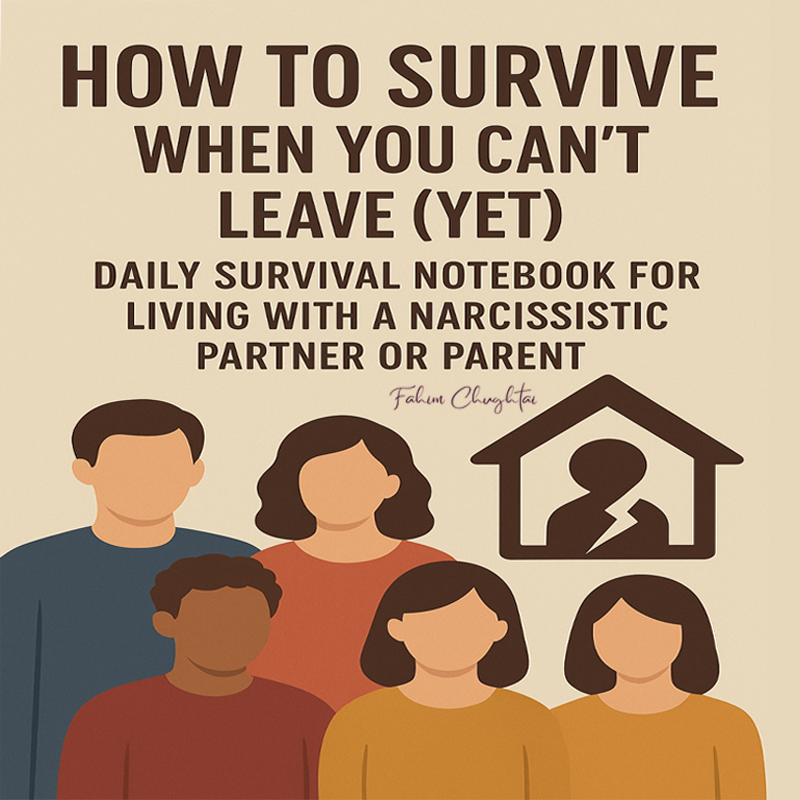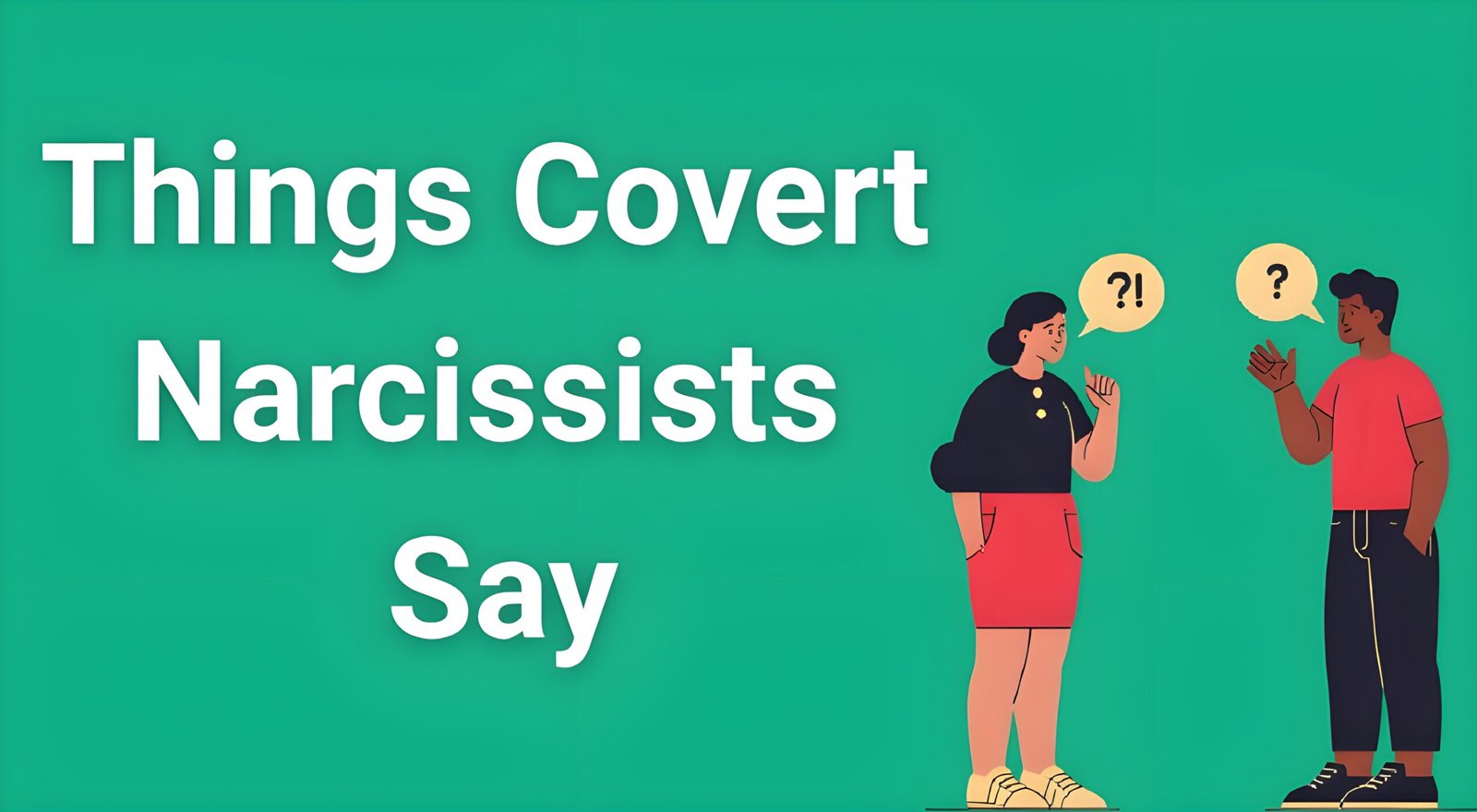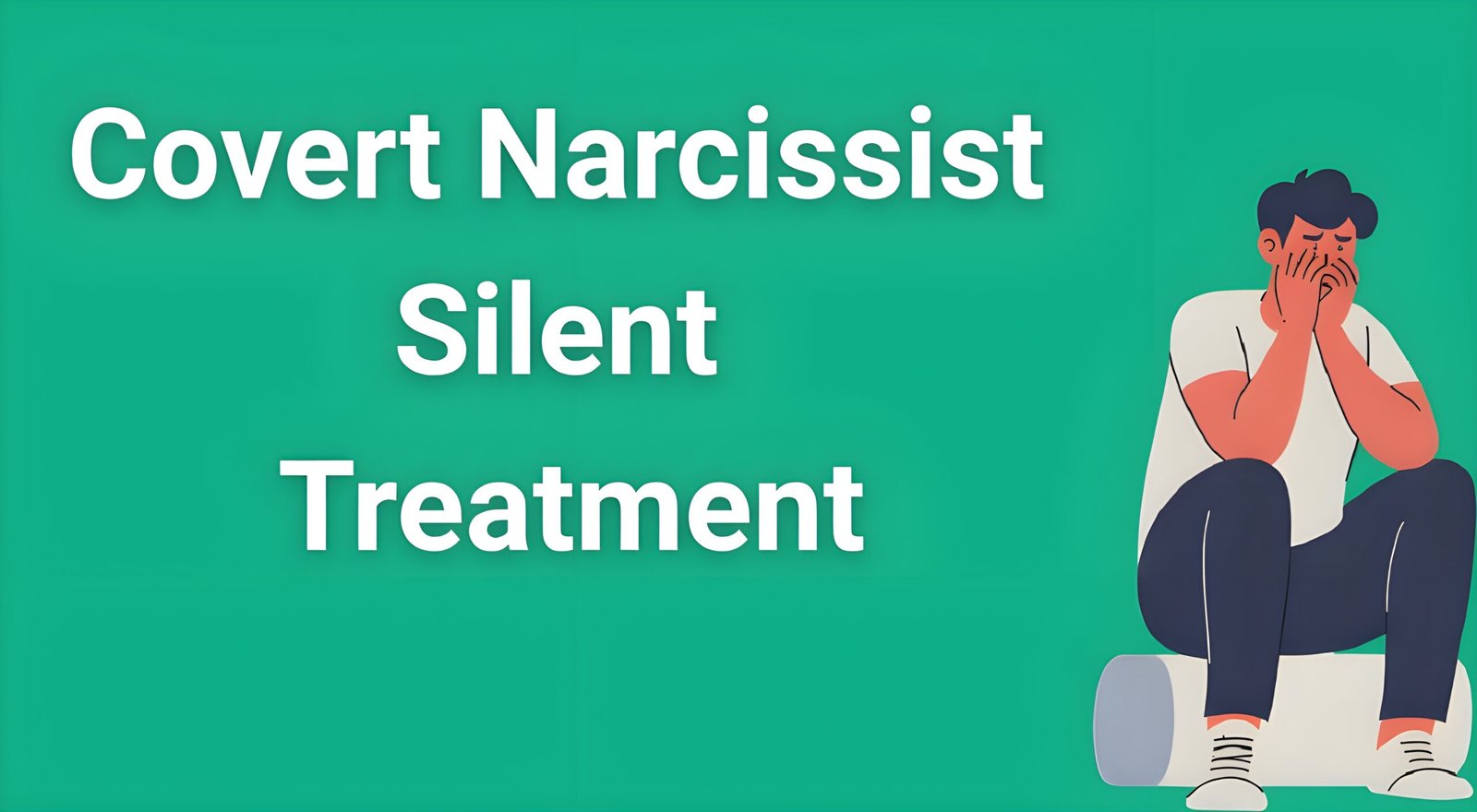Understanding the things covert narcissists say can be the key to recognizing manipulation before it damages your mental health. Unlike their overt counterparts who demand attention openly, covert narcissists operate in shadows, using subtle phrases that seem innocent but carry devastating psychological impact.
- What Makes Covert Narcissist Communication So Dangerous?
- 25 Things Covert Narcissists Say (And What They Really Mean)
- The Psychology Behind Covert Narcissist Communication
- How to Protect Yourself from Covert Narcissist Manipulation
- When Professional Help May Be Necessary
- Breaking Free from the Confusion
- Frequently Asked Questions
- Conclusion
If you’ve ever felt confused, questioned your own memories, or walked on eggshells around someone, you might be dealing with covert narcissistic abuse. These individuals weaponize words to maintain control while appearing humble, caring, or even victimized themselves.
What Makes Covert Narcissist Communication So Dangerous?
Covert narcissists, also known as vulnerable narcissists, mask their manipulation behind a facade of sensitivity and introversion. Their phrases often sound reasonable on the surface, making it difficult to pinpoint exactly why interactions with them leave you feeling drained, confused, or questioning yourself.
The key difference lies in intent and pattern. While anyone might occasionally use these phrases innocently, covert narcissists deploy them systematically as tools of control, designed to:
Am I Dealing With a Covert Narcissist — or Just Toxic Behavior?
- Shift blame away from themselves
- Make you question your own reality (gaslighting)
- Position themselves as victims
- Maintain emotional control over you
- Avoid accountability for their actions
Research shows that covert narcissistic abuse can be particularly damaging because victims often don’t realize they’re being manipulated until significant psychological harm has occurred. The subtle nature of these tactics makes them harder to identify and easier to dismiss as “misunderstandings.”
25 Things Covert Narcissists Say (And What They Really Mean)
Gaslighting and Reality Distortion
1. “You’re imagining things.”
This classic gaslighting phrase dismisses your perception of reality. When a covert narcissist says this, they’re attempting to make you doubt your own memory and intuition. They use this phrase to avoid accountability while making you question your sanity.
How to respond: “I trust my perception of what happened. Let’s agree that we remember things differently.”
2. “That never happened.”
Covert narcissists frequently deny events that clearly occurred, especially when those events paint them in a negative light. This is a deliberate attempt to rewrite history and make you doubt your memory.
How to respond: “I remember it clearly. I’m not interested in debating what we both know happened.”
3. “You’re being too sensitive.”
This phrase invalidates your emotional response while suggesting that your feelings are inappropriate or excessive. It’s designed to make you suppress your natural reactions to their harmful behavior.
How to respond: “My feelings are valid, whether you agree with them or not.”
Blame-Shifting and Deflection
4. “You made me do this.”
Covert narcissists rarely take responsibility for their actions. Instead, they position you as the cause of their behavior, making you feel responsible for their choices and reactions.
How to respond: “Everyone is responsible for their own actions, including you.”
5. “If you hadn’t [done something], I wouldn’t have reacted that way.”
This is another form of blame-shifting that makes their reaction your fault. They’re essentially saying that your behavior justifies their inappropriate response.
How to respond: “Your reaction is your responsibility, regardless of what I did.”
6. “You’re the only one who has a problem with me.”
This phrase is designed to isolate you and make you feel like you’re the unreasonable one. It suggests that your concerns are unique and therefore invalid.
How to respond: “Other people’s opinions don’t change how your behavior affects me.”
Minimization and Dismissal
7. “It’s not that big of a deal.”
Covert narcissists often minimize your concerns to avoid addressing them seriously. This phrase dismisses the importance of your feelings and experiences.
How to respond: “It’s important to me, and that makes it worth discussing.”
8. “You’re overreacting.”
Similar to calling you “too sensitive,” this phrase suggests that your response is disproportionate to the situation. It’s a way of avoiding responsibility while making you feel foolish for caring.
How to respond: “This is how I feel about the situation, and my feelings matter.”
9. “I was just joking.”
When their hurtful comments are called out, covert narcissists often claim they were joking. This allows them to deliver insults while maintaining plausible deniability.
How to respond: “Jokes are supposed to be funny for everyone involved. That felt more like an insult.”
Victim Playing and Manipulation
10. “I’m always the bad guy.”
This self-pitying statement is designed to make you feel sorry for them and stop holding them accountable. They position themselves as the victim of your “unfair” treatment.
How to respond: “I’m not trying to make you the bad guy. I’m trying to address a specific behavior.”
11. “No one understands me like you do.”
This phrase is often used to create a false sense of special connection while simultaneously isolating you. It suggests that you’re the only one who truly “gets” them, making you feel obligated to tolerate their behavior.
How to respond: “Understanding someone doesn’t mean accepting harmful behavior.”
12. “I can’t do anything right in your eyes.”
This dramatic statement is designed to make you feel guilty for having standards or expectations. It positions them as a victim of your supposed perfectionism.
How to respond: “I’m asking for basic respect, not perfection.”
Control and Manipulation
13. “If you really loved me, you would…”
Covert narcissists often weaponize love to manipulate behavior. This phrase puts you in a position where refusing their request means you don’t love them enough.
How to respond: “Love doesn’t mean doing everything someone asks. It means respecting boundaries.”
14. “You’re the only person who makes me feel this way.”
This statement appears to give you special significance while actually making you responsible for their emotional state. It’s a form of emotional manipulation that puts pressure on you to manage their feelings.
How to respond: “You’re responsible for your own emotions, just as I’m responsible for mine.”
15. “I don’t remember saying that.”
Conveniently “forgetting” hurtful things they’ve said is a common tactic. It allows them to avoid accountability while making you question whether the conversation actually happened.
How to respond: “Whether you remember or not, it happened and it affected me.”
Subtle Put-Downs and Criticism
16. “You used to be more fun.”
This nostalgic criticism suggests that you’ve changed for the worse. It’s designed to make you feel inadequate while positioning them as the authority on who you should be.
How to respond: “People grow and change. I’m comfortable with who I am now.”
17. “I’m just trying to help you.”
Covert narcissists often disguise criticism as helpful advice. This phrase allows them to deliver hurtful observations while maintaining the appearance of caring.
How to respond: “I didn’t ask for advice. If I want help, I’ll ask for it.”
18. “You always take things the wrong way.”
This phrase suggests that communication problems are always your fault. It implies that you consistently misinterpret their perfectly reasonable statements.
How to respond: “If I’m consistently misunderstanding you, maybe we need to look at how you’re communicating.”
Emotional Manipulation
19. “You’re impossible to please.”
This statement makes you feel demanding and unreasonable for having expectations. It’s designed to make you lower your standards rather than them raising their behavior.
How to respond: “Having standards isn’t the same as being impossible to please.”
20. “I’m walking on eggshells around you.”
This role reversal makes you feel like you’re the difficult one. It’s particularly manipulative because it takes the experience you likely have with them and flips it back on you.
How to respond: “If you feel that way, perhaps we should examine what’s creating that dynamic.”
21. “You know I didn’t mean it that way.”
This phrase dismisses the impact of their words by focusing solely on their claimed intent. It suggests that you should ignore the effect of their communication because they didn’t “mean” to hurt you.
How to respond: “Intent doesn’t erase impact. Your words still affected me.”
Avoidance and Deflection
22. “Why can’t we just move on?”
When confronted about their behavior, covert narcissists often want to skip past accountability and consequences. This phrase attempts to rush you through processing your feelings.
How to respond: “Moving on happens after we properly address what happened.”
23. “You’re bringing up the past again.”
This phrase dismisses legitimate concerns by labeling them as “old news.” It’s designed to make you feel petty for remembering their previous harmful actions.
How to respond: “Patterns of behavior are relevant to current situations.”
24. “I already apologized for that.”
Covert narcissists often believe that a single apology should erase all consequences and future discussion of their behavior. This phrase is meant to shut down ongoing accountability.
How to respond: “Apologizing is just the first step. Changed behavior is what matters.”
25. “You’re not perfect either.”
When confronted with their behavior, covert narcissists often deflect by pointing out your flaws. This “whataboutism” is designed to make you feel hypocritical for holding them accountable.
How to respond: “This conversation is about your behavior right now. We can discuss my behavior separately if needed.”
The Psychology Behind Covert Narcissist Communication
Understanding why covert narcissists use these phrases helps you recognize the patterns and protect yourself. Their communication serves several psychological functions:
Maintaining the False Self: Covert narcissists have created a carefully constructed image of themselves as sensitive, misunderstood, or even victimized. Their phrases support this false narrative while deflecting from their actual behavior.
Avoiding Narcissistic Injury: When their self-image is threatened, narcissists experience what psychologists call “narcissistic injury.” The phrases they use are defensive mechanisms designed to protect their fragile ego from criticism or accountability.
Projecting Their Issues: Many of the things covert narcissists say are actually projections of their own behaviors and feelings onto you. When they accuse you of being “too sensitive” or “impossible to please,” they’re often describing themselves.
Creating Cognitive Dissonance: By consistently contradicting reality with their words, covert narcissists create cognitive dissonance—the mental discomfort you feel when your experience doesn’t match what you’re being told. This dissonance makes you more susceptible to their manipulation.
How to Protect Yourself from Covert Narcissist Manipulation
Recognizing these phrases is only the first step. Here are strategies to protect your mental health and maintain your sense of reality:
Trust Your Instincts: If something feels off about an interaction, trust that feeling. Your intuition is picking up on subtle cues that your conscious mind might miss.
Document Interactions: Keep a journal of conversations and incidents. This helps you maintain clarity about what actually happened and recognize patterns over time.
Set and Maintain Boundaries: Clear boundaries protect your mental health. When someone crosses a boundary, address it immediately and consistently.
Limit JADE (Justify, Argue, Defend, Explain): Don’t over-explain your feelings or decisions to someone who consistently dismisses them. A simple “That doesn’t work for me” is often sufficient.
Build a Support Network: Maintain relationships with people who validate your experiences and provide healthy perspectives. Isolation makes you more vulnerable to manipulation.
Still Living With Them? You’re Not Helpless.

Practice Self-Validation: Learn to validate your own feelings and experiences. You don’t need external confirmation that your emotions are legitimate.
When Professional Help May Be Necessary
If you’re dealing with covert narcissistic abuse, professional support can be invaluable. Consider seeking help if you’re experiencing:
- Constant self-doubt about your own memories or perceptions
- Anxiety or depression related to the relationship
- Difficulty trusting your own judgment
- Isolation from friends and family
- Physical symptoms of stress (headaches, sleep issues, digestive problems)
Sometimes, the psychological damage from covert narcissistic abuse runs deeper than we initially realize. Understanding exactly what you’re dealing with can provide the clarity needed to make informed decisions about your relationships and recovery.
You’ve Seen the Patterns. Now Break the Bond.
A comprehensive analysis of your specific situation can help identify the subtle manipulation tactics being used against you and provide a roadmap for protecting your mental health. Many survivors find that having their experiences validated by an expert helps them trust their own perceptions again and move forward with confidence.
Breaking Free from the Confusion
One of the most insidious aspects of covert narcissistic abuse is how it makes you question your own reality. The phrases they use are specifically designed to create confusion, self-doubt, and emotional dependency. Recognizing these patterns is the first step toward reclaiming your mental clarity and emotional freedom.
Recovery from covert narcissistic abuse often involves rewiring thought patterns that have been systematically distorted. This process takes time, patience, and often professional guidance. The neurological impact of sustained manipulation can create trauma bonds that feel impossible to break through willpower alone.
Understanding the science behind trauma bonding can be crucial for recovery. When someone alternates between kindness and cruelty, your brain becomes neurologically addicted to the relationship, similar to how addiction works with substances. This explains why leaving or maintaining boundaries with a covert narcissist can feel physically and emotionally overwhelming.
Frequently Asked Questions
Q: How can I tell if someone is a covert narcissist or just having a bad day?
A: The key difference is pattern and intent. Everyone occasionally uses these phrases, but covert narcissists use them systematically as tools of control. Look for consistent patterns over time rather than isolated incidents.
Q: Can covert narcissists change their behavior?
A: While personality change is theoretically possible, it requires genuine self-awareness and sustained effort that narcissists rarely possess. Focus on protecting yourself rather than trying to change them.
Q: Why do I feel sorry for them even when they hurt me?
A: This is a normal response to their victim-playing tactics. Covert narcissists are skilled at eliciting sympathy, which keeps you engaged in the toxic dynamic.
Q: Should I confront them about their manipulative language?
A: Direct confrontation often leads to more manipulation and gaslighting. Instead, focus on setting boundaries and protecting your own mental health.
Q: How long does it take to recover from covert narcissistic abuse?
A: Recovery time varies greatly depending on the duration and intensity of the abuse, your support system, and whether you seek professional help. Many survivors begin feeling clearer within weeks of recognizing the patterns, but full healing can take months to years.
Conclusion
The things covert narcissists say are carefully crafted weapons designed to maintain control while avoiding accountability. By recognizing these phrases and understanding their true intent, you can protect yourself from manipulation and begin to reclaim your reality.
Remember that healing from covert narcissistic abuse is a process that takes time and often requires professional support. Trust your instincts, maintain your boundaries, and know that your feelings and experiences are valid, regardless of what anyone else says.
Your mental health and emotional well-being are worth protecting. Don’t let anyone convince you otherwise—not even with the most innocent-sounding phrases.






